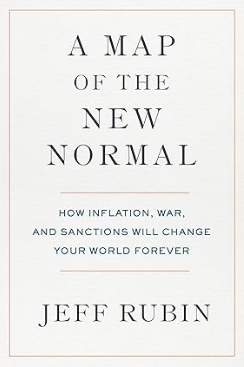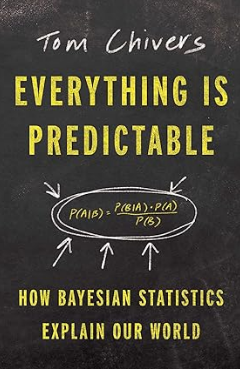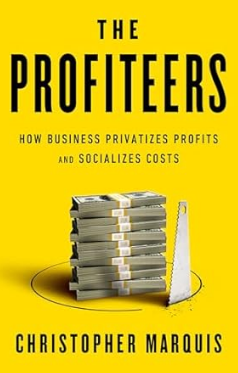
Book Bits: 18 May 2024

By purchasing books through this site, you provide support for The Capital Spectator’s free content…● A Map of the New Normal: How Inflation, War, and Sanctions Will Change Your World Forever Jeff Rubin Adapted essay from book via The Globe and Mail The world is engulfed in an ever-escalating…
 ● A Map of the New Normal: How Inflation, War, and Sanctions Will Change Your World Forever
● A Map of the New Normal: How Inflation, War, and Sanctions Will Change Your World Forever
Jeff Rubin
Adapted essay from book via The Globe and Mail
The world is engulfed in an ever-escalating global trade war. Virtually every day, new sanctions are being imposed, triggering reciprocal actions against Western goods.
Where will this lead? Can the West still win such wars, as it has done before? If not, what are the consequences of losing?
Along with sanctions has risen a new world order in which the United States and its NATO allies can no longer use their economic and military power to unilaterally dictate terms to the rest of the world.
 ● Everything Is Predictable: How Bayesian Statistics Explain Our World
● Everything Is Predictable: How Bayesian Statistics Explain Our World
Tom Chivers
Review via The Wall Street Journal
First articulated in the 18th century by a hobbyist-mathematician seeking to reason backward from effects to cause, Bayes’ theorem spent the better part of two centuries struggling for recognition and respect. Yet today, argues Tom Chivers in “Everything Is Predictable,” it can be seen as “perhaps the most important single equation in history.” It drives the logic of spam filters, artificial intelligence and possibly our own brains. It may soon help us work through tricky social problems like vaccine hesitancy. Once you start to look for it, Mr. Chivers says, you start to see Bayes’ theorem everywhere.
At its core, the theorem provides a quantitative method for getting incrementally wiser by continuously updating what you think you know—your prior beliefs, which initially might be subjective—with new information. Your refined belief becomes the new prior, and the process repeats.
 ● The War on Prices: How Popular Misconceptions about Inflation, Prices, and Value Create Bad Policy
● The War on Prices: How Popular Misconceptions about Inflation, Prices, and Value Create Bad Policy
Ryan A. Bourne
Review via Reason.com
Prices are guardians of scarce resources, ensuring that these are allocated to their most valuable uses. Prosperity results from the encouragement given to the production of goods and services that people desire most.
There is someone else who sees the price system for its beauty and would like to protect it from continued government interferences: the Cato Institute’s Ryan Bourne. He has an excellent new book, The War on Prices: How Popular Misconceptions about Inflation, Prices, and Value Create Bad Policy. It includes 24 essays written by some of the best economists in the business, each addressing a different aspect of today’s war on prices—the widespread and counterproductive ways governments are trying to control inflation or particular prices.
 ● The Coming Decline: A World Without Economic Growth
● The Coming Decline: A World Without Economic Growth
Michael Weidokal
Summary via publisher (International Strategic Analysis)
The new book from ISA Executive Director Michael Weidokal, The Coming Decline: A World Without Economic Growth, is now available for purchase.
This book explains how the world is slowly, but surely, facing a future in which economic growth is no longer assured. In fact, growth has already been trending downwards in most of the world’s most important economies, a fate that most of the rest world is likely to face without a massive transformation of the economy and our society.
From the Roman Empire to the modern day, The Coming Decline uses a wealth of historical examples to show readers why economies decline, and what this means for the future of our civilization. Readers will learn why our global economy is in danger of entering a period of stagnation and decline, and what this means for our future.
 ● Unexpected Revolutionaries: How Central Banks Made and Unmade Economic Orthodoxy
● Unexpected Revolutionaries: How Central Banks Made and Unmade Economic Orthodoxy
Manuela Moschella
Summary via publisher (Cornell U. Press)
In Unexpected Revolutionaries, Manuela Moschella investigates the institutional transformation of central banks from the 1970s to the present. Central banks are typically regarded as conservative, politically neutral institutions that uphold conventional macroeconomic wisdom. Yet in the wake of the 2008 global financial crisis and the 2020 COVID-19 crisis, central banks have upended observer expectations by implementing largely unknown and unconventional monetary policies. Far from abiding by well-established policy playbooks, central banks now engage in practices such as providing liquidity support for a wide range of financial institutions and quantitative easing. They have even stretched the remit of monetary policy into issues such as inequality and climate change.
 ● The Venture Alchemists: How Big Tech Turned Profits Into Power
● The Venture Alchemists: How Big Tech Turned Profits Into Power
Rob Lalka
Review via Publishers Weekly
In this ponderous debut account, Tulane University business professor Lalka profiles Mark Zuckerberg, Peter Thiel, and other Silicon Valley tech moguls who, he contends, have enriched themselves while subjecting ordinary people to constant surveillance and dispossessing them of their own data. His subjects include Google founders Larry Page and Sergey Brin, whom Lalka criticizes for excluding users from the profits generated by the data they produce while searching the site. Uber founder Travis Kalanick is condemned for defying state labor laws to avoid giving drivers benefits and for letting employees use passenger data to track their one-night stands. Lalka suggests the wrongdoings of Silicon Valley CEOs stem from the philosophies of free-market economist Milton Friedman, who rejected the idea of corporate social responsibility, and capitalist ideologue Ayn Rand, who extolled the selfishness of “superior” men as a virtue.
 ● The Profiteers: How Business Privatizes Profits and Socializes Costs
● The Profiteers: How Business Privatizes Profits and Socializes Costs
Christopher Marquis
Summary via publisher (Public Affairs/Hachette)
An exposé of how society pays for corporations’ “free lunch” and the cost of environmental damage, low wages, systemic discrimination, and cheap goods. In an age when business leaders solemnly profess dedication to principles of environmental and social justice, Christopher Marquis’s provocative investigation into the real costs of doing business reveals the way that leaders of the corporate world gaslight to evade responsibilities by privatizing profits and socializing costs. “Who pays?” for the resulting climate and environmental damage, racism, low wages, and cheap goods: the average citizen and the taxpayer.
 ● Cities in the Sky: The Quest to Build the World’s Tallest Skyscrapers
● Cities in the Sky: The Quest to Build the World’s Tallest Skyscrapers
Jason M. Barr
Q&A with author via ABC News
Q: You write: ‘When we look around the world, we see the skyscrapers are steadily sprouting upward, even as economics, politics, city patterns, and technology change.’ What do you believe drives the pursuit of constructing taller buildings?
A: Well, I would say that fundamentally it’s urbanization. People are moving to cities. People are working in cities. People are playing in cities. And around the world, cities are more important than ever. And so, really, at the heart of it, tall buildings are just a way to help cities grow. And also, there’s just massive improvements in technology that make building taller and taller easier and easier. So it’s really the combined forces of both the desire to be in cities, along with the, technology that makes it easier to make these buildings tall.
 ● The Divine Economy: How Religions Compete for Wealth, Power, and People
● The Divine Economy: How Religions Compete for Wealth, Power, and People
Paul Seabright
Summary via publisher (Princeton U. Press)
Religion in the twenty-first century is alive and well across the world, despite its apparent decline in North America and parts of Europe. Vigorous competition between and within religious movements has led to their accumulating great power and wealth. Religions in many traditions have honed their competitive strategies over thousands of years. Today, they are big business; like businesses, they must recruit, raise funds, disburse budgets, manage facilities, organize transportation, motivate employees, and get their message out. In The Divine Economy, economist Paul Seabright argues that religious movements are a special kind of business: they are platforms, bringing together communities of members who seek many different things from one another—spiritual fulfilment, friendship and marriage networks, even business opportunities. Their function as platforms, he contends, is what has allowed religions to consolidate and wield power.
Please note that the links to books above are affiliate links with Amazon.com and James Picerno (a.k.a. The Capital Spectator) earns money if you buy one of the titles listed. Also note that you will not pay extra for a book even though it generates revenue for The Capital Spectator. By purchasing books through this site, you provide support for The Capital Spectator’s free content. Thank you!
Author: James Picerno
